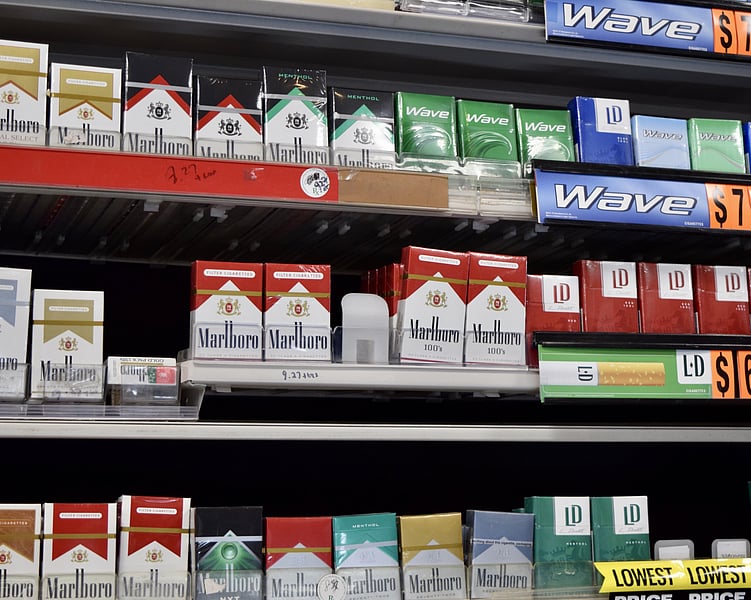As Menthol Ban Nears, Big Tobacco Is Adding Synthetic Version to Cigarettes Instead
By Cara Murez HealthDay Reporter | Copyright © 2022 HealthDay. All rights reserved.

WEDNESDAY, Oct. 11, 2023 (HealthDay News) -- Cigarette makers are using synthetic menthol substitutes in what appears to be an effort to skirt a looming federal menthol ban, researchers say.
The menthol flavor appeals to younger and newer smokers, according to investigators at Duke Health in Durham, N.C., and Yale University in New Haven, Conn.
These new “non-menthol” cigarettes are being introduced in states that have already banned actual menthol in advance of a U.S. Food and Drug Administration ban later this year.
In studying these “non-menthol” products, researchers identified new compounds that achieve cooling sensations similar to menthol.
“We found that tobacco companies are adding a synthetic cooling agent called WS-3 to these new ‘non-menthol’ cigarettes,” said senior author Sven-Eric Jordt, an associate professor at Duke University School of Medicine.
“The added amounts are sufficient to produce robust cooling sensations, with some brands having more cooling activity than their menthol equivalent cigarettes,” he said in a university news release
California and Massachusetts have already banned menthol cigarettes.
After California’s December 2022 ban, RJ Reynolds and ITG introduced non-menthol cigarettes with packaging and marketing strategies similar to those of menthol products.
Lead author Sairam Jabba, a senior research scientist at Duke, measured whether cigarettes purchased in the two states with bans contained chemicals that activate the cold/menthol receptor.
“We found that four of the non-menthol cigarette products, all manufactured by RJ Reynolds, robustly activated the cold/menthol receptor, and this cooling activity was stronger than of their menthol counterparts,” Jabba said.
“These results signify that these new ‘non-menthol’ cigarettes can produce the same cooling sensations as menthol cigarettes and thereby facilitate smoking initiation,” he said. “Allowing these cigarettes to be marketed would nullify several of the expected public health benefits from state and federal bans of menthol cigarettes.”
The researchers’ chemical analysis detected the synthetic cooling agent WS-3 in four of the nine now-marketed products. Although the products lack menthol’s minty smell, they do produce the cooling effect. The investigators also noted vanilla and tropical flavor chemicals in these cigarettes.
“Our discovery of restricted flavors such as vanilla, which have characteristic odor and taste, demonstrates that big tobacco is ignoring current federal regulations banning the addition of characteristic flavors to cigarettes," Jordt said. "More importantly, vanilla flavor is very popular among children and youth, making it easy for them to initiate on these cigarettes.”
Historically, menthol cigarettes have also been aggressively marketed toward Black people. Up to 90% of Black smokers use menthol cigarettes.
“FDA regulators need to develop effective strategies for the control of odorless cooling agents and flavors that threaten to bypass tobacco flavor bans,” Jordt said.
The study findings were published online Oct. 9 in a research letter in the Journal of the American Medical Association.
Funding for the study was provided by the U.S. National Institute on Drug Abuse, the National Institutes of Health and the FDA's Center for Tobacco Products.
More information
The U.S. Centers for Disease Control and Prevention has more on the health effects of smoking.
SOURCE: Duke University, news release, Oct. 9, 2023




 Like the DIY idea of Dr. Leonardo websites, but just don’t want to Do-It-Yourself? We understand! Fussing over website details isn’t for everyone. But we do love building websites with our builder and we’re kind of obsessive about how we do things. Plus, we can build them lickety-split – typically in
Like the DIY idea of Dr. Leonardo websites, but just don’t want to Do-It-Yourself? We understand! Fussing over website details isn’t for everyone. But we do love building websites with our builder and we’re kind of obsessive about how we do things. Plus, we can build them lickety-split – typically in